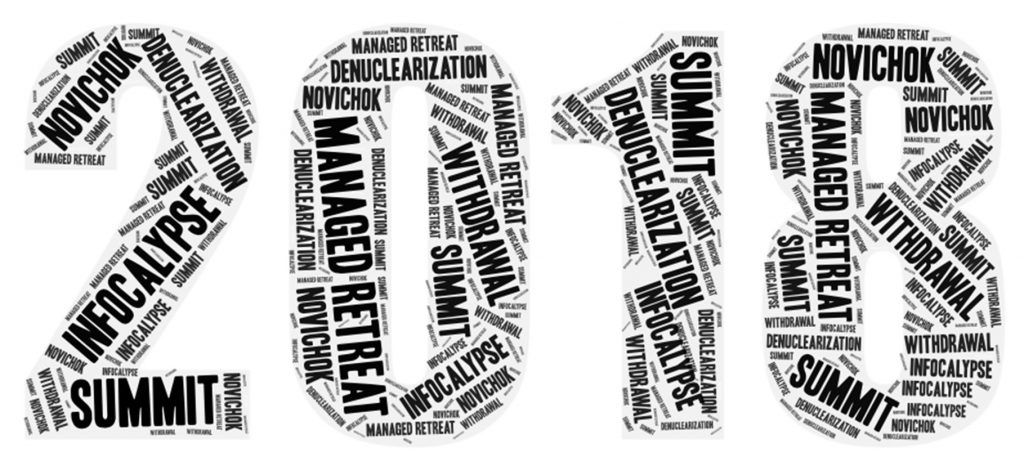Six words that defined 2018
By Thomas Gaulkin | December 31, 2018

Of the hundreds of thousands of words published by the Bulletin in 2018, some were especially emblematic of the year’s news and events—which, as in 2017, were often overwhelmed by the US president’s penchant for the dramatic. Here’s a brief guide to key terms found in the Bulletin‘s coverage this year, with a few suggestions for deeper dives.
denuclearization
North Korea’s supreme leader Kim Jong-un set the tone for 2018 with a new year’s address that both boasted about North Korea’s nuclear status and offered an olive branch to Seoul ahead of the countries’ joint appearance at the Winter Olympics. Kim then met with South Korean president Moon Jae-in in April, and after a diplomatic rollercoaster, met with Donald Trump for an unprecedented summit in Singapore. One word from their joint statement invited particular scrutiny by experts. “Denuclearization” first appears in the Bulletin’s pages in the late 1950s, around the time North Korea first proposed a nuclear weapons free zone with South Korea. But the regional prominence of the term today is traceable to the early 1990s and the Joint Declaration of the Denuclearization of the Korean Peninsula. In a sign of things to come, that treaty never went into effect, leaving the practical significance of the word up in the air. Now, following a year of mostly friendly exchanges instead of missile tests, satellite imagery nevertheless suggests that North Korea’s nuclear and missile programs are ongoing, and a second US summit seems stalled with the White House in turmoil. There’s little to suggest we’re any closer to understanding what denuclearization might ultimately mean for everyone involved.
- The United States has learned the wrong lessons from previous diplomacy with North Korea, by Christopher Lawrence
- How to measure the success or failure of the Trump-Kim summit, by Cheon Seong-whun
- How to tell if North Korea is serious about denuclearization, by Duyeon Kim
summit (à la Singapore or Helsinki)
Presidential visits overseas are always keenly watched affairs. Long shots of Air Force One on the tarmac in airports across the globe are obligatory on all news networks. But Donald Trump elevated the spectacle to something unprecedented this year, and not just once. It’s unlikely anything will ever quite match the weirdness of his June 12 meeting with Kim Jong-un in Singapore, from the volatile lead-up to the bizarre Hollywood ending. Then, before the world could catch its breath, Trump was off to Helsinki, for a meeting with Vladimir Putin that featured the most scrutiny in history of the hidden intentions behind every presidential word and gesture. The debate over what these landmark events were really about and what, if anything, was accomplished will surely continue well into 2019, if not beyond. But there is widespread agreement about one thing: the established rules of diplomacy and negotiation have been thrown out of Air Force One’s window.
- Fulfilling the promise of the Trump-Kim Singapore summit, by James E. Goodby
- A Bulletin editorial: Now, it’s time to deliver
- Analyzing the Helsinki summit
withdrawal
2018 might also be remembered as the year the US promised to break promises. Throughout the year, President Trump made potentially world-altering moves against hard-won international agreements. The tally of disruption reads a bit like a boxing match: The Iran Deal was dealt a potentially lethal blow. One of the last arms control agreements between the world’s biggest nuclear powers, the Intermediate-Range Nuclear Forces Treaty, looks headed for a TKO over alleged violations. Proposals for a new military force entered the ring, riling fans of the neutrality of space. The Paris agreement, Trump’s big target last year, held on for another round at the December follow-up in Katowice, Poland (with a child referee)—but how much longer?
- Expert commentaries: Trump withdraws from the Iran nuclear deal. What now?
- Collection: The INF Treaty and the Future of Arms Control
- Space Force: Lost in space?, by Lawrence J. Korb
managed retreat
As higher average global temperatures lead to melting polar ice, rising seas increasingly threatens coastal regions around the world, including those of the United States. In the first story published through the Bulletin’s new Climate Desk partnership—one that could only be told now, when both need and time remain to plan for the worst—a southern California city grapples with the idea of moving eight blocks east, away from the looming ocean. For some small island nations, a strategy of “managed retreat” will require even more drastic changes, like relocating entire countries to higher ground. The alarming findings in this year’s Intergovernmental Panel on Climate Change special report and the 2018 National Climate Assessment confirmed that moving away from the coasts will be an increasingly necessary response to climate change.
- Will Imperial Beach, California, retreat from a rising sea?, by Ruxandra Guidi
- The coastal retreat has begun, by Lucien Crowder
- Sea level rise—from my front porch, by William A. Stiles Jr. (paywall; get 10 free articles)
novichok
The poisoning of former Russian spy Sergei Skripal in Britain (along with his daughter and two others) was the latest example of a worrying trend—a diminishing taboo against the use of chemical weapons, from alleged attacks on civilians in the Syrian conflict to the apparent assassination of Kim Jong-un’s half-brother with the nerve agent VX. The Skripal case, and Russia’s official denial of responsibility, brought renewed attention to the deadly class of weapons known as novichok, or “newcomer.” Development of these weapons began half a century ago in the Soviet Union. But despite Russia’s accession to the Chemical Weapons Convention in 1997, the novichok agents remain undeclared. It’s sobering to consider that in 2018 the world commemorated a century since the end of World War I, just as the worst weapons of that conflict are making a return.
- London attack: Saddle Moscow with chemical weapons inspections, by Amy E. Smithson
- North Korea’s other weapons of mass destruction, by Alexandra Bell and Abby Pokraka
- The slow death of nonproliferation norms, by Charles P. Blair
infocalypse
As if uncertainty over nuclear proliferation, chemical weapons, and climate change wasn’t enough, events in 2018 also spotlighted the fact that the very idea of certainty is threatened. Increasingly effective “deep fake” videos can put words in the mouths of public figures. Bad information circulates ever more quickly with the help of hackers and social media bots, though efforts to combat these are developing along with the threat. Helped by big data gatherers in Silicon Valley, foreign actors like Russia and China are at the center of epic political scandals and attempts to undermine democratic systems and other important norms around the world. But there’s no need to travel so far to see that confidence in the truth has been weakened by US officials too, in broad daylight: in the aftermath of a recent presidential press conference, White House attacks on the media reached new lows, proving complex technologies like deep fake videos aren’t necessary to undermine public trust. It’s all part of the impending “infocalypse,” a notion being advanced by the University of Michigan’s Center for Social Media Responsibility. As the center’s director Garlin Gilchrist told the Bulletin in June, “it’s the end of our ability to trust what we’re seeing, what we’re reading, what we’re hearing. When that happens, the fallouts can be things like just giving up and not caring anymore—what we refer to as ‘reality apathy.’”
- Interview by Dawn Stover: Garlin Gilchrist: Fighting fake news and the information apocalypse (paywall; get 10 free articles)
- The Russian disinformation attack that poses a biological danger, by Filippa Lentzos
- Interview by Elisabeth Eaves: The California lawmaker who wants to call a bot a bot
Together, we make the world safer.
The Bulletin elevates expert voices above the noise. But as an independent nonprofit organization, our operations depend on the support of readers like you. Help us continue to deliver quality journalism that holds leaders accountable. Your support of our work at any level is important. In return, we promise our coverage will be understandable, influential, vigilant, solution-oriented, and fair-minded. Together we can make a difference.














